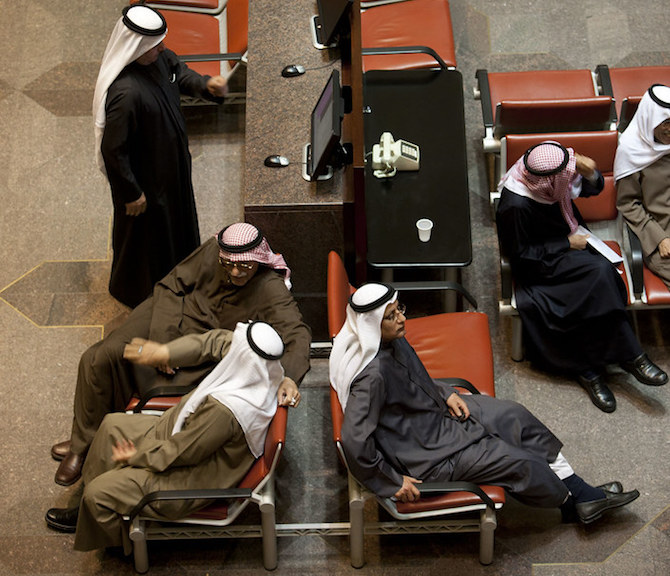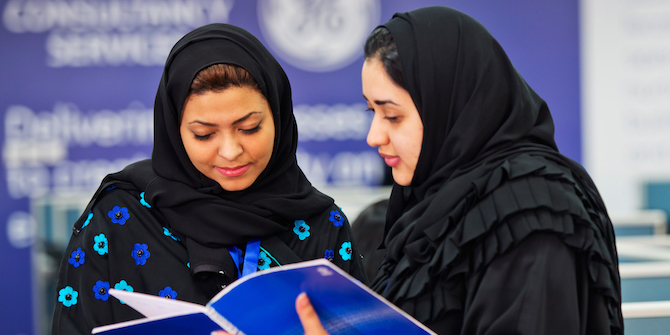by Courtney Freer

Investors sit inside the Kuwait Stock Exchange building in the financial district of Kuwait City on 1 February 2012. Source: Kuwaitelections2012, Flickr
On 26 May, the Kuwait Programme hosted its annual research workshop online, on the theme of reforming welfare systems and the social contract in Kuwait and the GCC more broadly. The discussion featured research from Steffen Hertog on the potential for introducing a universal basic income in Kuwait, as well as comments from Michael Herb (Georgia State University) about the importance of economic reforms in Kuwait being politically palatable and from Tim Callen (International Monetary Fund, IMF) about the shared issue across the GCC of high spending on public sector wages.
The workshop raised a number of themes concerning the sustainability of generous rentier packages in the Gulf, particularly as hydrocarbon revenue is declining. Hertog’s remarks, based on his Kuwait Programme paper released late last year, suggest universal basic income as a potential replacement for other cash grants to Kuwaiti citizens, which have until now come in the form of public sector wages and subsidies. He suggests instead a monthly cash grant for those individuals outside of the public sector. Implementing universal basic income instead of putting in place measures like taxation could improve economic incentives and could, in his view, gradually replace energy subsidies and excess public employment, both of which are very costly to the Kuwaiti state at present.
In his comments, Michael Herb highlighted that, particularly in Kuwait, the GCC state with the most active and vocal parliament, any reforms to the welfare state must be politically acceptable, which has constrained government actions in the past. He also pointed out the four goals of distribution of oil rents: efficiency, equity, rewarding those who contribute and preparing for the future (a future in which there will be less rent available from hydrocarbon resources). Thus far, recommendations from bodies like the IMF to reform current wealth redistribution in Kuwait have been politically impossible, as Kuwaitis have come to expect a share of the national wealth. He pointed out that the structural imbalance of too few Kuwaitis in the private sector has in the past been redressed by adding foreign labour rather than by using national labour in that sector, resulting in a segmented labour force. Herb therefore sees Hertog’s suggestion of decoupling financial distribution from the state from employment as a means of decreasing the supply of foreign labour gradually and in a humane way to allow for greater participation of nationals in the private sector and a more balanced labour force in terms of nationals’ employment in the public and private sectors.
Tim Callen broadened the discussion beyond Kuwait to examine the common issue among the GCC states of high spending on public sector wages. He also noted the wage gap between the public and private sectors and the mismatch between wages and productivity, both of which have intensified a segmented labour force between expatriates and nationals. He highlighted reforms which he believes can be implemented most readily and have been put in place in Saudi Arabia: increasing electricity and gas prices, introducing VAT and other excises, a new social security law and a Citizens Account programme to compensate lower income citizens. In terms of introducing a cash grant as Hertog suggested, Callen said that it is less distortionary than existing means of distributing oil wealth than the provision of public sector jobs. He also said that it is easier for those countries with relatively high oil revenues and relatively small populations (Kuwait, Qatar, UAE) to implement such a policy. Still, there are few successful examples of countries which have changed from providing public sector jobs to universal cash grants or which have weaned themselves off of oil wealth, which makes it difficult to suggest a model for reform.
Part of the wide-ranging discussion which I found most interesting was the question of whether Kuwait is a unique case because its constitution, which has played a major role in political debates, specifies employment as a right of citizens. Article 41 states: ‘Every Kuwaiti shall have the right to work [….] Work is the duty of every citizen. Dignity requires it and public welfare ordains it. The State shall make work available to citizens and shall see to the equity of its conditions.’ There was a debate about how much is promised through this article, as well as a discussion about Kuwaiti exceptionalism.
I have found, however, that similar text appears in the constitutions of other GCC states (article 13 of the Bahraini Constitution, article 12 in the Omani Constitution, article 28 in the Qatari Constitution, article 28 of the Saudi Constitution, article 20 in the Emirati Constitution). The Bahraini document goes so far as to proclaim that: ‘The State guarantees the provision of job opportunities for its citizens.’ The fact that these provisions are included is a testament to how foundational the rentier economy was for these states and remains to this day. Several questions arise as a result. When constitutions have explicitly promised the provision of work to citizens, how can they change course? Would a change to universal basic income fundamentally change social contracts in the GCC? Steffen Hertog’s paper and the workshop discussing it helped to spur debate about these issues, which will undoubtedly remain ongoing in the GCC for decades to come.







1 Comments